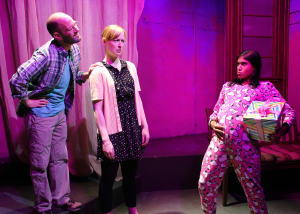Quirky ‘Samsara’ in Anaheim Hills delivers birth with a modern tone
by Eric Marchese
 While the essentials of childbirth have been unchanged for millennia, medical science and technology have brought breakthroughs for those facing infertility.
While the essentials of childbirth have been unchanged for millennia, medical science and technology have brought breakthroughs for those facing infertility.
Economics, though, affect who benefits, and who gets the short end of the stick.
As we see in Lauren Yee’s quirky comedy “Samsara,” which had its world premiere earlier this year and is enjoying its West Coast premiere at Chance Theater’s newly minted 49-seat second stage, human emotions haven’t quite caught up with scientific miracles.
At first, the issues on display in “Samsara” seem pretty cut-and-dried: Bay Area couple Katie (Jennifer Ruckman) and Craig (James McHale) Haber have tried almost obsessively to conceive a child, but to no avail.
“Samsara” opens with Craig and Katie trying every which way, literally, to get Katie pregnant despite varied intercourse positions staged for boisterous laughs (of note: the actors are fully clothed).
Katie, as it stands, is infertile. Once the couple discusses surrogacy, their desire for a child of their own seems wholly within reach.
The only process they can afford is using a surrogate from India. And they want to be there for the baby’s birth. As Katie’s fear of flying keeps her grounded, Craig ventures alone to the city of Ahmadabad.
The couple struggles to stay connected while half a world apart. “Samsara” follows Craig’s interactions with Suraiya (Anisha Adusumilli), the young Indian woman he and Katie have chosen to carry their baby.
We also follow Katie as her imagination manufactures a stereotypical Frenchman (Jason Paul Evans) who represents the anonymous sperm donor the couple used when it’s found Craig is sterile.
Just as given to doubts and second-guessing is Suraiya, who generates a vision of her as-yet unborn son in the form of a cheeky youth (Ray Parikh) garbed as a prep school student.
By craftily interspersing segments of the Habers’ videotaped application for a surrogate with other scenes, Yee stresses many of the at-first unseen chinks in the armor of their marriage.
In Yee’s whimsical, offbeat play, each new wrinkle in the Habers’ plans appears innocent – but glitches have a way of piling up. Yee shows a deft hand in meshing sexual, social, medical and cross-cultural issues with a combination of dream sequences, fantasies and touches of surrealism.
Her self-assured play-writing and storytelling styles find a nice complement in Benjamin Kamine’s direction and in the willingness of his cast of five to go with Yee’s off-the-wall, singular theatrical voice.
As we also see in Chance’s staging of “Samsara,” in life, what often leads to what’s most momentous – such as the decision to have children – are completely unrelated factors.
Some of the best moments involve Suraiya’s attempts to explain the quirks of reality to her son as she wrestles with the complexities of having someone else’s baby, then never seeing him again.
Suraiya is surprisingly frank with Amit, prompting him to hold nothing back. Because she keeps him warm, he calls her “microwave.” And though his name means “infinite,” her impatience with his backtalk leads her to call him “(dung)head.”
Suraiya also explains things to Craig, such as the concept of Samsara – the continuous, repeating cycle of birth, life and death. “Nothing ever goes away,” she tells him. “It just comes back as something else.”
The concept of back-and-forth plays out in enjoyably light fantasy scenes of Katie’s interaction with the Frenchman, who grows impertinent and increasingly strident, forcing her to reckon with her underlying unhappiness.
“Samsara’s” characters are bright and even brilliant, and clearly educated and well-read. All, though, are refreshingly free of egotism, pomposity and self-congratulation. Yee skillfully proves that the words “subtle” and “comedy” aren’t mutually exclusive – something Kamine and his cast have perfected.
For much of “Samsara,” Ruckman’s Katie and McHale’s Craig are easygoing, upbeat, go-with-the-flow kind of people whose marriage is, on the surface, idyllic. The tension that develops is gradual.
Adusumilli projects an ineffable sadness, her Suraiya’s dreams of becoming a doctor a catalyst in her agreeing to become a surrogate. The actor’s lighter moments have her portraying the Habers’ infant daughter.
Parikh’s Amit is playfully precocious – inquisitive and eager to understand the world around him. Evans delivers an insouciant Frenchman as he plays on clichés about such characters. In a smaller role, his fertility clinic doctor is a brutally blunt bozo with an offbeat sense of humor.
By now, audiences and theater enthusiasts alike should realize that Chance Theater is like a hip-cool, younger version of South Coast Repertory – and just as thoroughly professional all around as that venerated O.C. institution.
Leave a Reply

